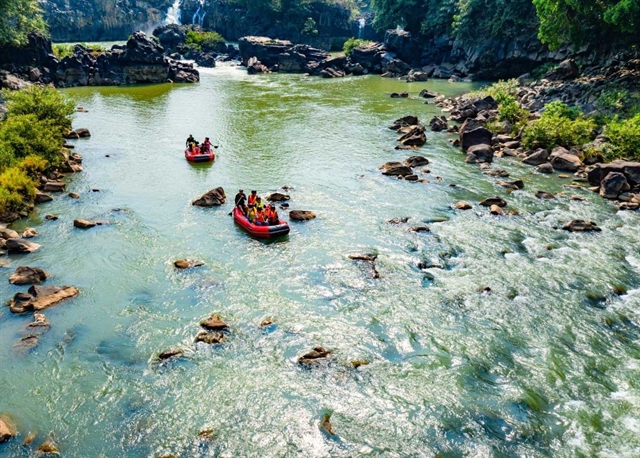Chu Bluk cave complex located in Krông Nô District, Đăk Nông Province, about 40km south of Buôn Ma Thuột City, is the longest volcanic cave in Southeast Asia. It is known as an iconic destination of the Central Highlands.

Discovering Chu Bluk volcanic cave complex in Đắk Nông Province. — Photo sgtiepthi.vn
Thanh Lâm
Nestled deep in the jungles of the Central Highlands, Chu Bluk volcanic cave complex is an attractive trekking destination for tourists.
Chu Bluk cave complex located in Krông Nô District, Đăk Nông Province, about 40km south of Buôn Ma Thuột City, is the longest volcanic cave in Southeast Asia. It is known as an iconic destination of the Central Highlands.
This is a completely new place for people who love to travel and explore because it was only discovered in 2014. Therefore, the cave complex still retains its inherent wildness.
Chu Bluk volcanic cave complex, also known as the Dơi (Bat) Cave, stretches around 25km from the Dray Sáp Waterfall to Buôn Choah Cave. It includes more than 100 large and small caves thanks to the flow of lava millions of years ago, hidden in basalt. According to researchers, the process of forming large and small caves inside took place 3,700 years ago by volcanic eruptions.

Chu Bluk cave complex was formed by volcanic eruptions. — Photo sgtiepthi.vn
The path to Chu Bluk comprises a 9km trekking route that is scary but exciting as people have to walk on an uneven path covered with volcanic stones and wild grass. The entire journey offers charming views of the blue sky and majestic mountains.
The cave can be observed from afar because it is located in the middle of a large empty hill area that stands out with its stunning scenery.
After crossing a difficult road, we found the cave entrance, which is a round crater with a diameter of 600m and a depth of 60m. If the outside is a dry forest, inside is the strong and diverse growth of plants. It is the place of bats, as it seems that darkness covers and coldness penetrates the skin, but in fact it is an airy and mysterious place.
Sometimes, some rays of sunlight peep in through the cracks on the cave walls. It is cold and humid inside, giving us a nervous, prickly feeling. Sometimes, the sound of falling water droplets breaks the silence.
Looking at the surface of basalt rocks, we could discover the formation of the cave from millions of years ago. Along the way, there are rocks with rough shapes formed from lava pouring out of the crater. The cave was created in the same way, according to scientists.
We were also welcomed by a grave wall covered with layers of ferns that looked quite fancy and mysterious. Lava rocks lie everywhere on the road leading deeper into the cave. The yellow and red flows of lava can be seen on the ground, while the cave's wall is decorated with lines of different shapes.
One of the highest caves in the Chu Bluk volcanic cave complex is cave C9, a tubular cave. On the wall, there are lava stalactites, lava shelves, and traces showing the level of lava and the direction of that ancient lava flow.
In this cave, there are many bats, and when they are waken up by the sound and light of humans, they rush out in all directions, so we feel like we are lost in a mysterious place.
In addition to trekking activities in the lava fields, climbing and swinging rope to explore Chu Bluk volcanic caves, we also experienced sitting on a boat along the legendary Sêrêpôk River to admire the wild beauty of this place.

Visitors experience sitting on a boat along the legendary Sêrêpôk River. — Photo sgtiepthi.vn
We also had the chance to cycle around the local villages and coffee farms, camp overnight and enjoy a cup of hot coffee and grilled meat by the poetic Dray Nur Cascade.
Chu Bluk is cool all year round. Therefore, tourists can visit the cave at any time. Late spring and summer is a favourable time because of the sunny weather and low possibility of rain, allowing tourists to easily approach the cave and take stunning photos.

Camping at Chu Bluk cave complex. — Photo sgtiepthi.vn
The cave system is complex and difficult to access, so tourists should contact the forest management board and hire local guides to ensure safety. — VNS